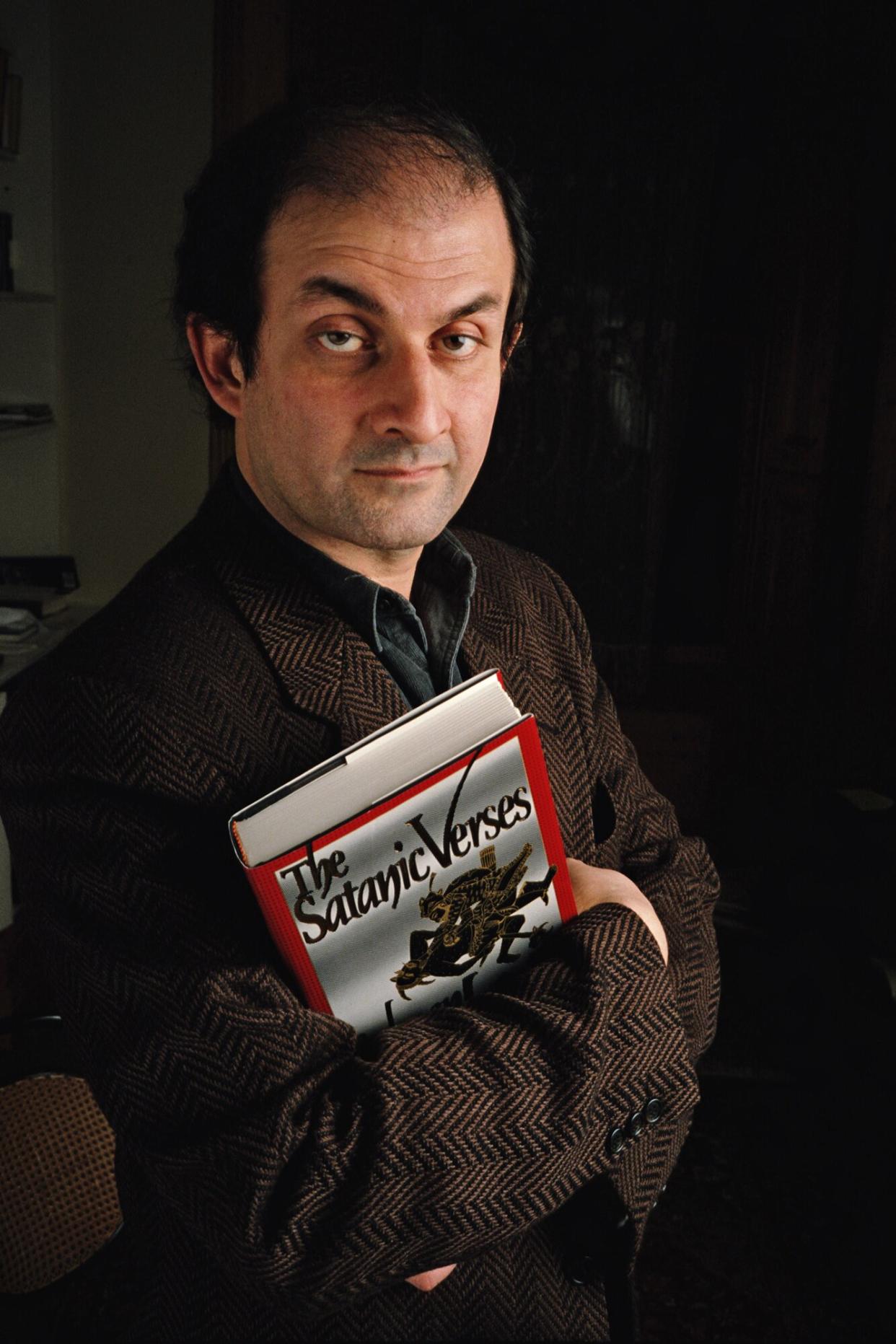What to Know About Salman Rushdie's Satanic Verses Controversy

- Oops!Something went wrong.Please try again later.
- Oops!Something went wrong.Please try again later.
David Levenson/Getty
Salman Rushdie, who on Friday was attacked while giving a lecture in New York, is one of the most well-regarded novelists of the 20th century, having published books including Midnight's Children (which won three Booker Awards) and Shame. But the Indian-born British writer rose to global prominence in 1989, when his book The Satanic Verses was condemned by Iranian leader Ayatollah Rullolah Khomeini for blasphemy.
The book portrayed a fictionalized version of the Prophet Mohammed and an interpretation of the Quran that caused a stir in the Muslim community and eventually led to a condemnation from Khomeini that included a fatwa (a ruling on Islamic law) calling for his assassination, with a bounty for whomever executed it. Rushdie had to go into hiding in the immediate aftermath, and lived under the death threat until 1998, when the Iranian government said it would no longer enforce the fatwa (though it remained active).
At the time the fatwa was issued, Rushdie, himself Muslim by birth, said to Britain's Press Association, ''It is not true this book is a blasphemy against Islam. I doubt very much Khomeini or anyone else in Iran has read the book or anything more than selected extracts taken out of context.'' He became an outspoken advocate for free speech in the wake of these events.
In 1989, PEOPLE covered Rushdie's exile and the impact on his marriage to writer Marianne Wiggins. Read excerpts from our coverage at the time, below.
Like bad opium dreams, hallucinations already filled Salman Rushdie's novels—and even dogged I his nights. Once, an evil Martian in a Mercedes-Benz made him wake up screaming. But in 1989 he really stepped in Dada by offending the Ayatollah Khomeini. In an unprecedented act of transnational terrorism, Khomeini put a contract out on Rushdie, and British Intelligence had to step in to protect his life, not just his freedom of speech. Since Feb. 14 Rushdie has been in hiding, darting from one safe house to another. His marriage to writer Marianne Wiggins has now shattered under the strain.
The Bombay-born novelist, 42, well knew the fire and rigor of Islam when he wrote The Satanic Verses; he was raised an upper-middle-class Muslim before being sent off to England in his teens. And he has picked fights before: In 1984 Indira Gandhi sued him for slander. But did he intend Verses' portrayal of Mohammed as a liar to so infuriate the faithful? Nobody knows. From hiding he issued a statement of "profound regret." The rest is silence.
Bomb-fearing bookstores refused to stock Rushdie's book until publicity changed their minds. Yet the controversy pushed sales of The Satanic Verses to more than 1 million—thousands more, presumably, than would have been sold had Khomeini kept his mouth shut. Not that many people actually completed the difficult book. Even the Ayatollah, who died in June, reportedly never read it.
Writer Salman Rushdie's Life on the Run Leaves His Marriage to Marianne Wiggins on the Rocks
The marriage of writers Salman Rushdie and Marianne Wiggins was reported to be shaky even before the Ayatollah Khomeini sentenced Rushdie to death for his alleged blasphemies in The Satanic Verses, and the enforced togetherness of six months in hiding could hardly have been expected to salvage it. The announcement, when it came on Aug. 25, was terse: "Marianne Wiggins has announced through her publishers, Seeker & Warburg, that she and her husband, Salman Rushdie, have been living separately for four weeks. Scotland Yard security arrangements for the protection of Mr. Rushdie have been reorganized since then, and Ms. Wiggins does not know where he is. Ms. Wiggins requests privacy. She is not prepared to discuss the matter further."
Wiggins, 41, who was born in Lancaster, Pa., met Rushdie, 42, an Indian-born Muslim, in 1986. They were married in January 1988 and, though there were rumors of professional jealousies on both sides, they were apparently content long enough to dedicate books to each other during the past year. Wiggins's novel John Dollar was inscribed "To my beloved Salman"; The Satanic Verses, simply "For Marianne."
The couple's lives turned to nightmare soon after Verses was published in Britain in September 1988. Muslims around the world protested, and Khomeini handed down Rushdie's death sentence on Feb. 14. Rushdie and Wiggins went into hiding. John Dollar had just been published and, according to the London Daily Telegraph, Wiggins was "upset that she was unable to publicize her book personally because of the death threat."
In an interview with the London Sunday Telegraph this summer, Wiggins spoke of the hardships of life on the run. She and Rushdie, she said, had slept in 56 different beds in four months. She also said, "I am married to him, and what I needed to do was to be with him and to make his life go forward."
That interview appeared July 30. If the statement from her publisher is accurate, Marianne Wiggins and Salman Rushdie had already gone their separate ways.

